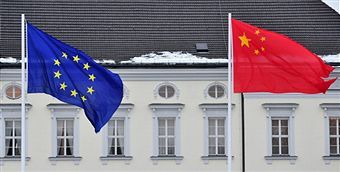 As if to illustrate Pete’s post about the rise of China and India, Chinese Vice Premier Li Keqiang has just finished a visit
to Spain during which agreements worth 5.7 billion euros were signed. The Chinese delegation is said to have committed itself to buying six billion euros of Spanish debt, which helped calm markets
and provided some relief for Spain’s recession-hit economy.
As if to illustrate Pete’s post about the rise of China and India, Chinese Vice Premier Li Keqiang has just finished a visit
to Spain during which agreements worth 5.7 billion euros were signed. The Chinese delegation is said to have committed itself to buying six billion euros of Spanish debt, which helped calm markets
and provided some relief for Spain’s recession-hit economy.
Around the time that the Soviet Union collapsed, the Chinese used to say only they could save communism. Twenty years on, it seems only they can save capitalism. The Spanish are certainly in no doubt about the importance of their newfound Chinese friends. The left-leaning Spanish newspaper El País wrote that that Li was received in Madrid as “a new Mr. Marshall,” a reference to US State Secretary George Marshall, whose plan to reconstruct post-war Europe, launched in 1947, triggered the economic rebuilding of Western Europe.
But Spain is not the only place China has been investing its £1,200bn reserves, looking to diversify away from US treasury bonds. Six months ago, another Chinese leader, Vice Premier Zhang Dejiang, sealed a number of deals on a visit to Greece, while Chinese shipping group Cosco paid the state more than £2.5 billion to lease much of Greece’s largest container port, a useful gateway for Chinese goods headed for Southern European markets. Britain is also a target market. Last year, a Chinese company, the country’s biggest aluminum producer, Aluminum Corp of China, injected billions into Rio Tinto Ltd, the London-based miner.
And in a clear move to shore up the euro, Yi Gang, head of China’s State Administration of Foreign Exchange, which oversees the currency reserves, said in a statement on the Central Bank’s website: “The euro and the European financial markets are an important part of the global financial system and were, are and will be one of the most important investment areas for China’s foreign exchange reserves.” As signs of support it does not get any clearer. Jinny Yan, an economist with Standard Chartered in Shanghai, estimated that China had invested between 26 percent and 28 percent of its reserves in the euro.
But what to make of all this? Chinese investment brings employment, tax revenue and, if the EU Commission negotiates well on behalf of the member-states, reciprocal market access. Help to Spain and Portugal may forestall crises. In the end, Chinese investment in the euro may save the single currency from collapse – something even the British government wants to avoid. But there are dangers as well, not least if China’s investment buys political clout. How will Spain behave over Tibet, Taiwan, North Korea or in climate negotiations with China in future? Can the other European states count on Spanish support at the UN? Cyprus already acts as China’s envoy to the EU, often offering draft language for EU communiqués that sounds as if they were drafted in Beijing, will China’s investment buy more friends. Perhaps more alarmingly, Europe does not have an investment review system like those in the US, Australia or Japan, to ensure that key sectors – and companies – are kept national.






Comments